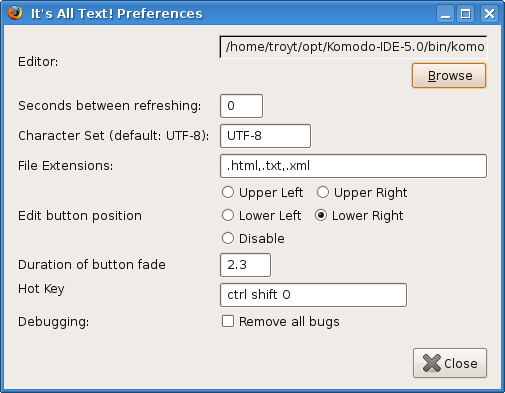OK, here’s the second post in the “How to use ActiveState software in strange ways” vein. I’m writing this post in Komodo. Not that surprising given where I work, but it’s interesting how I got from my web-based blog interface to a Komodo buffer.
A few months ago I discovered a great little Firefox extension called It’s All Text!. It allows you edit textareas in web pages using your favourite editor. This was incredibly useful for me as when using our web-based tech support ticketing system. I had come to rely on using vim and Text::Autoformat in conjunction with my email client to quickly fix quote wrapping ugliness, format bulleted lists nicely, and generally just make my replies more easily readable, so I was glad to finally be able to do the same type of thing with web mail clients.
At first, I used gvim for this because I’m used to it and it loads quickly. But, since I’ve got Komodo open pretty much all the time anyway (so Komodo just opens a new editor tab when It’s All Text! passes the temporary file), I thought it was time to eat some proverbial dogfood and use Komodo instead.
I can still use my trusty `perl -MText::Autoformat -eautoformat` thanks to Todd’s recent external formatters work, but in most cases Reflow Paragraph does what I need. The big wins for me are being able to use abbreviations with tabstops and getting auto-completion when I’m working in an HTML or code fragments.
By default, It’s All Text! creates temp files with a .txt extension which Komodo will treat as a Text file. You can change this on the fly in Komodo under “View|View as Language” (or the menulist in the bottom right corner in the status bar), but you can also configure It’s All Text! to give you a different default:
The first file type in the File Extensions list is the default. The rest are available from the extension’s context menu.
I admit, this is a small thing, but anything that saves me keystrokes in my workday makes me smile.






